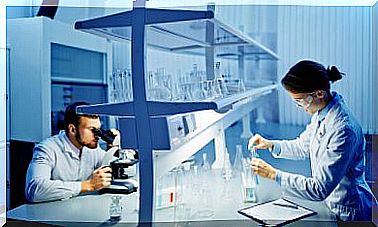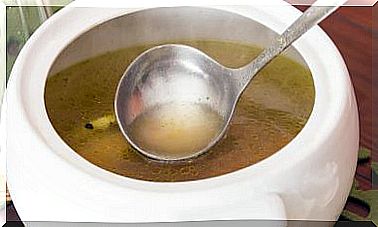These Signs Indicate That Your Liver Is Not Working
The liver is an essential organ of the human body. It carries out different functions in the body. There are several causes why it may stop working as it should. Here we tell you some of them and how to recognize when your liver is not working.
What does the liver do?
The liver is one of the most important organs in the human body. It is located just below the diaphragm, on the right side of the body. Besides being a very important organ, it is also one of the largest. It can weigh between 1 and 1.6 kilograms. The main functions of the liver are three:
- Filter the blood by removing toxins and substances that are harmful to the body. For example, some drugs and alcohol are metabolized in the liver. This consists of the liver cleaning the blood of these substances and transforming them into others that the body can either use or eliminate.
- Secreting bile: bile plays a very important role in digestion, since it is responsible for breaking down fats in the small intestine so that they can be absorbed. It also carries substances that are to be expelled from the body.
- Participate in the synthesis and storage of different elements: the liver synthesizes amino acids and proteins necessary for the body. It stores sugars in the form of glycogen, which will be transformed into glucose and sent to the blood when energy is needed. Stores fat, and some vitamins and minerals.
Why is the liver not working?
When the liver is not working as it needs to, the situation is called liver failure. This disorder can come on abruptly, or it can progress and slowly get worse over time.
There are many diseases that can affect the liver and cause it to stop working properly. Some of the most important are:
- Hepatitis: there are different types of hepatitis, such as autoimmune and hepatitis caused by viruses A, B, C, D and E.
- Alcohol abuse
- Liver cirrhosis
- Liver abscess due to bacterial infection
- Liver cancer: or metastasis to the liver from other types of cancer, such as colon cancer.
- Portal vein thrombosis: it is responsible for supplying blood to the organ.

What happens when the liver does not work?
When the liver stops working properly, there are many signs that we can observe in our body. The most notable are:
- Appearance of jaundice: jaundice is the yellowish color of the skin and mucous membranes. It occurs because bilirubin accumulates, a substance that the liver is responsible for breaking down when it works properly. It can be accompanied by itchy skin, as bilirubin that is not removed accumulates in the epidermis.
- Tiredness: when the glycogen, vitamins and minerals necessary to supply energy are no longer stored.
- Heavy digestions: with a feeling of bloating after meals, nausea and diarrhea. Pain may also occur on the side of the abdomen where the liver is located. As bile is not secreted, fats are poorly digested and lead to these symptoms.
- Pale colored stools and dark urine.
- Edema: in the legs, ankles and abdomen, which are perceived as swelling.
Diagnosis and prevention of liver failure
It must always be a doctor who evaluates the situation and performs the necessary tests to diagnose liver failure. The tests may be a blood test, imaging, or biopsy.
Some of the measures that can be carried out to prevent the liver from stopping working are:
- An adequate, healthy and balanced diet with little fat and salt content.
- Do not abuse alcohol or tobacco.
- Get vaccinated for hepatitis viruses.
Treatment of liver failure will depend on what causes it. Before any alarm symptoms, it is advisable to go to the doctor to diagnose and treat this condition as soon as possible.

In summary
The liver is an essential organ for our body that we have to take care of. It is important to maintain healthy habits and, of course, go to the doctor before any signs or symptoms that indicate that our liver is not working as it should.









